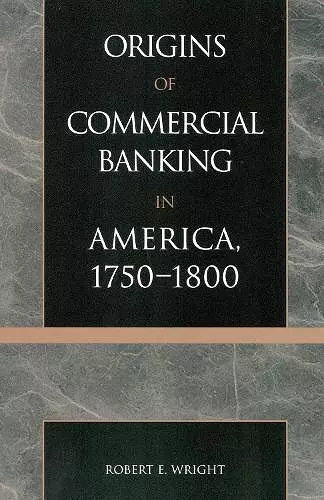The Origins of Commercial Banking in America, 1750-1800
Format:Hardback
Publisher:Bloomsbury Publishing PLC
Published:27th Aug '01
Currently unavailable, and unfortunately no date known when it will be back
This hardback is available in another edition too:
- Paperback£42.00(9780742520875)

The nature of America's early economy has been hotly contested for several decades. Historians have often focused on the question of when America became "capitalist," while economists have tried to determine when American economic growth sped up. In The Origins of Commercial Banking in America, Robert E. Wright argues that the ultimate causes of American economic development and transformation into a modern society can be reduced to the causes of American banking.
In the first full analysis of the origins of American commercial banking since Bray Hammond's monumental study forty-five years ago, Wright skillfully examines the political and economic forces that contributed to the origins and rise of banks in cities such as Philadelphia, New York, and Boston, as well as in smaller towns servicing rural America. Wright expertly assesses the impact of the war for independence, Superintendent of Finance Robert Morris' policies under the Confederation, the economic and political effects of the postwar depression of 1784-86, the attempts of the Constitutional Convention of 1787 to address the country's economic problems, and Secretary of the Treasury Alexander Hamilton's financial program under the new Constitution. Wright looks at both the macro and micro sides of issues—how state and national governments addressed problems and chartered (and sometimes unchartered banks) as well as how private individuals tried to cope with the need to obtain capital and the effects on them of early bankruptcy laws. He describes the varied and sometimes arcane financial and commercial instruments that existed both before and after the establishment of banks, and how they fostered economic development. We are introduced to an emerging capitalist system struggling to provide capital needed by America's voracious economy. The Origins of Commercial Banking in America is essential reading for anyone interested in the political and economic origins of the early republic.
This volume stands as the new starting point for gaining an understanding of the evolution of U.S. commercial banking. By revising the analytical model for all subsequent historians who embark on an examination of the origins of U.S. commercial banking, Robert Wright has made a major scholarly contribution. -- Edwin J. Perkins * H-Net: Humanities and Social Science Reviews Online *
Recommended for graduate and research collections. * Choice Reviews *
The many useful facts and characterizations of early American banking make this book a significant contribution. * Journal of Economic History *
A welcome addition to this ongoing research effort. His extensive archival and secondary research enables Wright to paint a penetrating portrait of the development of one aspect of the nation's early financial history—commercial banks—and demonstrate that their appearance played a central role in the economic and social changes that swept Revolutionary America....The Origins of Commercial Banking is an impressive work that deserves a wide audience among historians of early America's economic and social life. * Business History Review *
This work is recommended for economic historians interested in financial and banking history and the revolutionary period. * American Historical Review *
Wright. . . carefully recounts the political battles between rising middling entrepreneurs and established commercial interests over what kinds of institutions they wished to create. * Enterprise & Society *
One of the strengths of this book of this book is that it approaches its subject by looking at the colonial economy and the impact of the Revolution. This work argues persuasively that illiquidity defied the colonial economy. This is a very useful study of early mercantile practice and the origins of commercial banking. * Journal of American History *
ISBN: 9780742520868
Dimensions: 235mm x 155mm x 18mm
Weight: 417g
232 pages